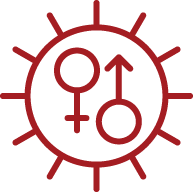Signs ofSexual Abuse
In Teenagers

Child abuse, including physical, sexual, and emotional harm, is alarmingly prevalent in our communities, and it is not unusual to hear about such cases in the news. According to data from RAINN, females aged 16-19 are four times more likely to be victims of rape, sexual assault, and attempted rape versus the general population. Additionally, one in 53 boys and one in nine girls aged 18 and under suffer sexual abuse or assault at the hands of an adult. RAINN statistics also indicate that 82% of all sexual abuse victims are females 18 and under.
Individuals who abuse teenagers are often known and trusted members of an abused teen’s community. A staggering 93% of child sexual assault incidents are at the hands of someone the child knows. These can be family members or those living with teens under the same roof.
The signs of sexual abuse in teenagers manifest differently from younger children, and adults should not misinterpret these indicators as normal behavioral changes expected at that age. Moodiness, withdrawal, and sudden outbursts are not uncommon among teens, but these seemingly ordinary actions might be signs that something far more serious is happening. It is critical to understand and identify the behavioral, physical, and emotional signs of sexual abuse among teens and develop a relationship of trust and confidence where your child feels secure to come forward.
Behavioral Signs
Teenagers who suffer sexual abuse will often exhibit sudden or unexplained changes in their actions, personalities, and behaviors. These individuals may become more introverted, or they may even lash out as a way of coping with the trauma they experience after sexual abuse.

Parents and educators often notice a sharp difference in teen behavior linked to sexual abuse. Some indicators of assault include:
- Poor academic performance
- Getting in trouble at school, including truancy and disobedience
- Social problems, like withdrawal from friends and school activities

Psychological disorders are another sign common among teen sexual assault victims. Evidence of abuse can manifest through:
- Suicidal or self-harming tendencies
- Emotional and physical outbursts
- Sexual promiscuity or unsafe sex
- Eating disorders

Some studies have also found that many teen victims of sexual abuse have tendencies towards illegal behavior that can result in arrests and other legal implications. Some signs include:
- Substance use and underage drinking
- Criminal behaviors, particularly sexual crimes like prostitution
Individually, these behaviors are not uncommon among teens and may not indicate sexual abuse; however, consider taking prompt action when a teen exhibits multiple red flags.
PHYSICAL INDICATORS
Sexual abuse can take an immense physical toll on a teen, so there may be a noticeable change in their weight or appearance. In some cases, signs of sexual trauma can manifest in self-harm and other physical injuries, including:

Teenage Pregnancy

Physical injuries
like bruising

Cutting or other signs of self-harm

Trouble walking or genital injuries

Sexually Transmitted Diseases (STDs)

Changes in appetite

Weight gain or sudden weight loss

Poor hygiene or an unkempt appearance
Physical signs of sexual abuse in teens will be different for each survivor. If you notice one of these changes, it may not serve as confirmation for sexual abuse, but multiple warning signs should be a cause for concern.
Emotional Signs
The other indicators of sexual abuse are nonphysical signs like changes in mental health or drastic changes in emotional stability. An open and communicative relationship with your teen can help you identify changes in their moods or emotional state. Some changes to watch out for include:

- Symptoms of post-traumatic stress disorder
- Depression
- Fear of being alone with someone
- Anxiety
- Low self-esteem
- Withdrawal
- Shame or guilt
- Isolation
- Aggression
Teens often exhibit emotional shifts that are typical in this age bracket, but multiple emotional issues combined with behavioral and physical problems are indicators of something more serious. Keep these signs in mind when observing your teen and stay alert to these changes.
Impact of Sexual Assault in Boys Versus Girls
While many symptoms of sexual abuse overlap between genders, some symptoms are more prevalent among teenage boys versus girls.
Sexual abuse among teenage boys may result in:
- Feelings of shame and diminished masculinity
- Confusion about sexual orientation
- Self-blame for an inability to stop an erection or ejaculation
- Increased fear of judgment
Teenage girls who are victims of sexual assault can exhibit:
- Feelings of fear that they are to blame for their assault
- Depression and Post Traumatic Stress Disorder (PTSD)
- Tendency towards revictimization
The Long-Term Effects of Sexual Abuse in Teens
Those who experience sexual abuse or assault as teenagers are at a greater risk for psychological issues, some of which manifest physically. Teenage sexual abuse has a long-term impact on victims. Below are some of the effects of assault that may linger:
Quite often, teenagers blame themselves after experiencing sexual abuse. This is often the case when the sexual predator is someone the victim trusts or someone they have a positive relationship with. These abusers may include teachers, family members, and clergy.
Teenage victims may find it difficult to view their abusers negatively because of their abuser’s role in their lives, and negative emotions can be carried for years. As a result, teens who suffer sexual abuse can succumb to low self-worth or self-esteem.
One of the predominant long-term impacts of teenage sexual abuse or assault is linked to sexuality and sex, where the physical and emotional effects can overlap. Teenage survivors of sexual abuse may experience the following:
- Male survivors may experience erectile dysfunction, and climaxing can be a challenge. Similarly, female victims may have difficulties reaching orgasm and may also experience vaginal pain during sex.
- Survivors may lose interest in sex or develop a phobia of sex, avoiding it altogether.
- Victims may face challenges initiating or maintaining intimate relationships with others.
- Teenagers who survive sexual abuse may view sex as an obligation due to manipulation or coercion by their abuser.
- Some sexual abuse survivors feel an increased need to have sex, often with multiple partners.
Actions to Take If You Suspect Teenage Sexual Abuse
When you suspect a case of teenage sexual abuse, the first thing you should do is talk to your teen about the recent change in their emotional or mental state. Ask them upfront if they are experiencing any form of sexual abuse or assault, including their relationship with a romantic partner. You should also let your teen know that sexual abuse is not their fault and that they should not be ashamed to come forward.
Offering to take your teen to a mental health professional like a counselor is also advisable. If you notice physical signs of teenage sexual abuse, consider taking the victim to a doctor. That will allow a doctor to diagnose your child’s symptoms or confirm any indicators of sexual abuse.
Consider talking to your teen about reporting the sexual assault to authorities. Legal action may also be an option should you and your teen wish to pursue justice.
Establishing an atmosphere of trust and respect is critical when talking to your teen about sexual abuse. Use language that is kind, loving, empathetic, delicate, understanding, and sensitive. Avoid patronizing tones. Instead, create an atmosphere of safety where they can share their experience, feelings, or concerns.
Verbal and non-verbal cues are important, including how you react to what your teen says, your body language, and the specific words you use. Ensure that your teen understands that your love and support for them will remain unconditional and unwavering, no matter what they share with you.
How a Child Sex Abuse Lawyer Can Help
There are federal pieces of legislation that offer protections for child sexual assault victims and outline penalties for perpetrators. These include:
This act targets states that have passed laws on the parental rights of men who father children through rape. The act includes blocking requests for visitation, custody, and termination of all other parental rights of the father. This bill is an amendment to the Justice for Victims of Sexual Trafficking Act of 2015.
Also known as the Wetterling Act, this federal law required states to implement a registry for sexual offenders and crimes against children. The act is named after Jacob Wetterling, an eleven-year-old child that went missing for 27 years before his remains were found in 2016.
The Kilah Davenport Act requires the U.S Attorney General to review and report each state’s penalties and prevention laws for child abuse to the congressional judiciary committees. This report includes a focus on each state’s “enhanced penalties when the victim has suffered serious bodily injury or permanent or protracted loss or impairment of any mental or emotional function.” The act is named after four-year-old Kilah Davenport, who was killed at the hands of her step-father.
The purpose of the Adam Walsh Child Protection and Safety Act (H.R. 4472) is to increase penalties for perpetrators of child sexual abuse. It was signed into law in 2006 and included the creation of a national sex offender registry. It organizes perpetrators into three tiers based on the nature of the crime they commit. The law was introduced in response to the death of a young boy, Adam Walsh, who was abducted in 1981 and found murdered 16 days later.
Incidents of sexual abuse involving teens attract high emotional stakes, and every instance of childhood sexual molestation, abuse, or assault is a serious violation punishable by law. Although the number of times survivors of teenage sexual abuse have to file a lawsuit varies by state, it is never too late to come forward.
A child sexual abuse lawyer can help you report a teenage sexual abuse incident to the appropriate authorities. They can also help build a case, navigate complex state laws, and file personal injury lawsuits.
If your teen has experienced sexual abuse or assault, legal action is an option worth pursuing. Although the process can be highly intimidating and challenging, the child sexual abuse attorneys at Herman Law can help victims hold their abusers accountable. A highly skilled and compassionate team will ensure that each client feels fully supported during the legal proceedings. If you know a teen who has been sexually abused, contact Herman Law to learn more about your options.
